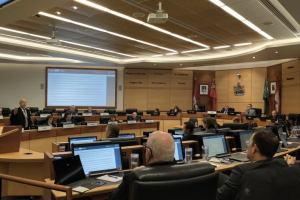Current leadership has eliminated need for change in Niagara
Allan BennerBy Allan Benner Standard Reporter
Niagara’s voters won’t have a say in selecting the region’s chair on Oct. 24.
Although Niagarans were to directly elect the regional chair in the 2018 municipal elections until the provincial government abruptly cancelled that plan, there was no political will to implement the change for this year’s elections.
The last time a motion came forward to review the way Niagara selects the head of regional council was in July 2020, when St. Catharines Coun. Laura Ip put forward a motion to its corporate services committee calling for the formation of a citizens committee to make recommendations on a range of governance issues, including the election of the regional chair, who is currently selected by regional councillors.
She said committee members at that meeting didn’t just vote down her motion, “they killed it.”
“They mashed it into the ground and stomped on it a few times,” Ip said with a laugh. “I don’t think the political will exists.”
It was defeated in an 11-2 vote, with the only support coming from Ip and Port Colborne Coun. Barb Butters.
Prior to the 2018 election, Ip said conversations about electoral change had been swirling around for several years, but those discussions became “louder because of the leadership last term.”
Those discussions, however, have become much quieter under the leadership of current Region Chair Jim Bradley.
“A lot of the discussion at least from my colleagues was, ‘We don’t need to do this, we have a good chair,’” Ip said.
Retired Brock University political science professor David Siegel agreed.
“With the problems that there were between 2014 and 2018, people just wanted to search for something better,” he said.
“But what’s happened since 2018, is that regional government hasn’t been at the forefront of the news very much anymore.”
While the controversies that marred the past term of council under leadership of Alan Caslin have for the most part subsided, Siegel said significant progress has been made on issues such as regional transit and waste management.
“People aren’t seeing a need for change,” he said.
Lincoln Coun. Rob Foster said issues such as the COVID-19 response have “refocused us on things other than if the regional chair should be elected.”
Foster, who leads Niagara’s corporate services committee, said “pretty good leadership” throughout the Niagara Region has eliminated the desire for change that was present in 2018.
“People are at Niagara Region for all the right reasons. We’re all collectively working through important issues,” he said. “We have big-ticket, long-term requirements that we have to do because we need it for the future of the region.”
Despite the improvements Niagara has seen since 2018, Ip said “it could happen again.”
“Just because this council overall — there are a couple of exceptions — is there for the right reasons, doing the best they can, listening to their constituents, any election could change that,” she said.
Ip said her motion went beyond just directly electing the regional chair. It was to include community consultation, to hear the ideas of voters regarding issues such as the number of elected officials, as well as increasing diversity on council.
“For me, a lot of the things that I brought forward were probably in response to last term,” she said. “But it’s still a matter of, ‘OK, but they’ve shown us that they can screw this thing up so let’s put things in place, so it is less easy to screw things up.’”
Siegel said “regional councillors will always be predisposed to feel that they would like to choose the head of council.”
“That’s a normal sort of thing,” he said.
Meanwhile, there’s no guarantee that voters would do a better job of choosing a regional chair.
“There’s no monopoly on good judgment here,” Siegel said.
Foster said a regionwide election for the head of council also has “a real danger of becoming partisan.”
“It’s going to cost a lot of money for someone to actually run for that position. It’s going to right off the bat stop a lot of people from being able to participate,” he said.
“I listen to the arguments from both sides of the political spectrum and I don’t think it resolves the problems that they think they have — and that is having that right person in place.”
He said the regional chair only has one vote and one voice, “and I don’t think the election of a regional chair is going to resolve some of the concerns of some people.”
Besides, Siegel said, it’s likely already too late for electoral changes to be made prior to the election.
Changes of that nature typically need to be approved by Jan. 1 of an election year, and require a triple majority vote — support from regional council and a majority of municipalities representing a majority of residents.
It would then have to clear a provincial appeal process and ultimately be given the Ontario government’s blessing.
Although there may be an option of putting a referendum question on the fall ballot, Ip said a motion to do that would likely still require a vote of reconsideration and “it’s still probably going to fail.”
“Let’s be honest, there’s no appetite for it,” she said.
Last Modified: -/-

